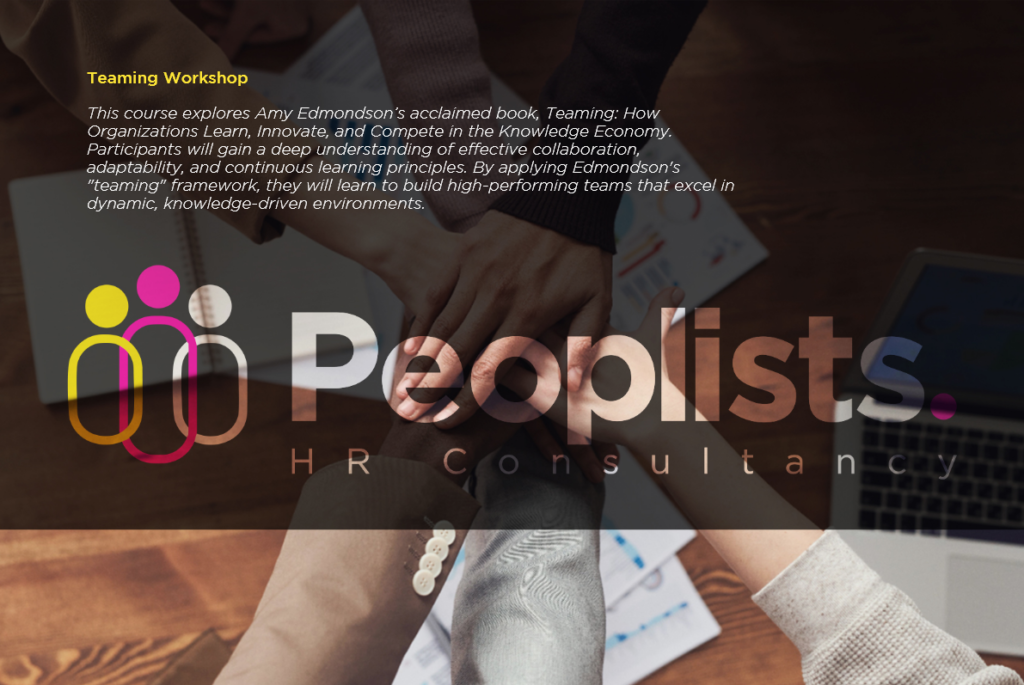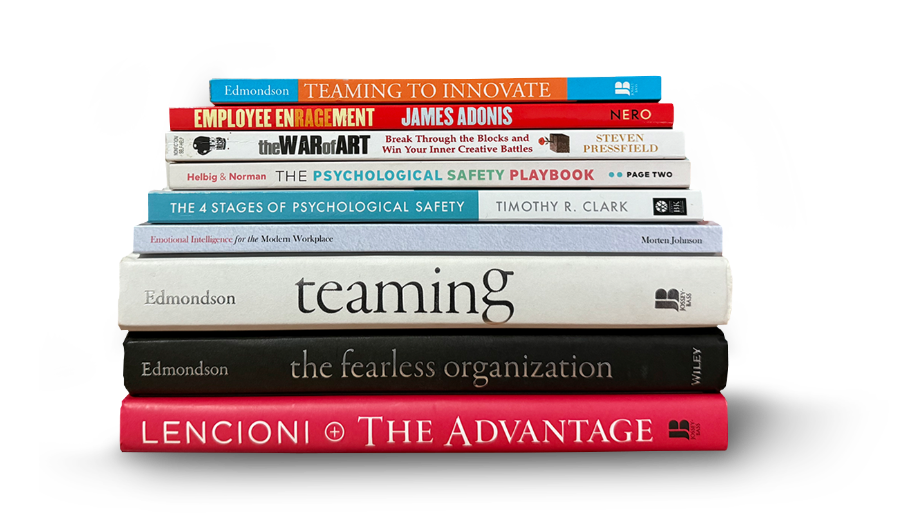
Overview![]()
Description
Teaming: Building High-Performing Teams in a Knowledge-Driven Economy
This course provides a comprehensive exploration of Amy Edmondson’s renowned book Teaming: How Organizations Learn, Innovate, and Compete in the Knowledge Economy. Participants will gain a deep understanding of the principles behind effective collaboration, adaptability, and continuous learning within teams.
By applying Edmondson’s groundbreaking insights into “teaming,” this course equips participants with the tools to:
![]() Foster high-performing teams capable of thriving in dynamic, knowledge-driven environments.
Foster high-performing teams capable of thriving in dynamic, knowledge-driven environments.
![]() Promote a culture of psychological safety, innovation, and collective problem-solving.
Promote a culture of psychological safety, innovation, and collective problem-solving.
![]() Adapt team structures to meet the demands of complex and ever-changing organizational challenges.
Adapt team structures to meet the demands of complex and ever-changing organizational challenges.
Why This Course is Essential:
Embrace Continuous Learning: Learn how teams can develop a culture of learning and innovation in response to fast-paced industry changes.
Build Collaborative Excellence: Master strategies to improve team dynamics and foster effective communication and trust.
Achieve Organizational Agility: Understand how to adapt team structures for maximum impact in knowledge-intensive industries.
This course is ideal for leaders, managers, and professionals seeking to drive organizational success through enhanced teamwork and innovation.
Target Audience
![]() Leaders
Leaders
![]() Managers
Managers
![]() Team Members
Team Members
![]() HR Professionals
HR Professionals
![]() Innovators
Innovators



Learning Outcomes: Teaming for High-Performing Teams
By the end of this course, participants will have the knowledge and skills to foster high-performing teams that excel in today’s knowledge-driven economy. Participants will learn to leverage the principles of Amy Edmondson’s “teaming” to drive innovation, collaboration, and continuous learning within their organizations.
Key Learning Outcomes:
Implement Teaming Principles:
Apply the teaming framework to improve team effectiveness and performance across various organizational settings.
Create a Culture of Psychological Safety:
Foster an environment where team members feel confident to voice concerns, propose innovative ideas, and learn constructively from failures.
Strengthen Collaboration Skills:
Cultivate the skills needed to enhance teamwork, ensuring cohesion and focus on achieving common goals, even in high-pressure or complex situations.
Enhance Innovation Through Team-Based Learning:
Use team-based learning techniques to adapt to new challenges, foster creativity, and thrive in dynamic, knowledge-intensive environments.
Why These Outcomes Matter:
These learning outcomes ensure that participants are equipped to lead and contribute to teams that excel in collaboration, adaptability, and innovation. By creating a culture of psychological safety and leveraging teaming principles, organizations can build resilient, high-performing teams capable of meeting the demands of a rapidly evolving economy.
Methodology: Mastering Teaming Principles for Organizational Success
This course combines the theoretical insights of Amy Edmondson’s “Teaming” with practical, hands-on applications, ensuring participants gain actionable skills to build high-performing teams.
The methodology is designed to provide a dynamic and interactive learning experience, with a focus on real-world applications and continuous development.
Key Components of the Methodology
Introduction to Teaming:
Overview of the concept of teaming and its critical relevance in today’s fast-paced, knowledge-driven economy.
Explore the importance of collaboration and continuous learning for sustained team success.
Interactive Workshops:
Session 1: Foundations of Teaming
Understand the core principles of teaming, with a focus on building communication, trust, and adaptability.
Session 2: Psychological Safety in Teams
Learn how psychological safety fosters innovation, organizational learning, and team performance.
Session 3: Innovating through Team Collaboration
Discuss strategies to drive innovation by leveraging the unique skills, perspectives, and experiences of team members.
Case Studies and Practical Applications:
Analyze real-world examples of organizations and teams that successfully applied teaming principles to achieve their goals.
Engage in group discussions to relate case study insights to participants’ specific workplace contexts.
Role-Playing and Team Simulations:
Participate in interactive team-building exercises and role-playing scenarios to practice applying teaming concepts.
Receive feedback on group dynamics and develop strategies to improve collaboration and trust.
Personal Development Plan:
Conduct a self-assessment to identify individual strengths and growth areas in collaboration and leadership.
Create a personalized plan to implement teaming principles within participants’ teams or organizations.
Follow-Up and Continuous Learning:
Offer post-course mentorship or group sessions to support participants in applying learned concepts.
Provide access to resources such as articles, toolkits, and strategies for fostering collaboration and innovation.
Methodology: Mastering Teaming Principles for Organizational Success
This course combines the theoretical insights of Amy Edmondson’s “Teaming” with practical, hands-on applications, ensuring participants gain actionable skills to build high-performing teams.
The methodology is designed to provide a dynamic and interactive learning experience, with a focus on real-world applications and continuous development.
Key Components of the Methodology
Introduction to Teaming:
Overview of the concept of teaming and its critical relevance in today’s fast-paced, knowledge-driven economy.
Explore the importance of collaboration and continuous learning for sustained team success.
Interactive Workshops:
Session 1: Foundations of Teaming
Understand the core principles of teaming, with a focus on building communication, trust, and adaptability.
Session 2: Psychological Safety in Teams
Learn how psychological safety fosters innovation, organizational learning, and team performance.
Session 3: Innovating through Team Collaboration
Discuss strategies to drive innovation by leveraging the unique skills, perspectives, and experiences of team members.
Case Studies and Practical Applications:
Analyze real-world examples of organizations and teams that successfully applied teaming principles to achieve their goals.
Engage in group discussions to relate case study insights to participants’ specific workplace contexts.
Role-Playing and Team Simulations:
Participate in interactive team-building exercises and role-playing scenarios to practice applying teaming concepts.
Receive feedback on group dynamics and develop strategies to improve collaboration and trust.
Personal Development Plan:
Conduct a self-assessment to identify individual strengths and growth areas in collaboration and leadership.
Create a personalized plan to implement teaming principles within participants’ teams or organizations.
Follow-Up and Continuous Learning:
Offer post-course mentorship or group sessions to support participants in applying learned concepts.
Provide access to resources such as articles, toolkits, and strategies for fostering collaboration and innovation.
